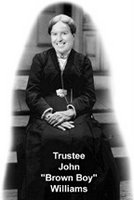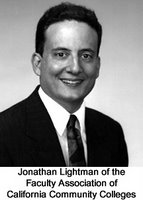 he most recent edition of the State Academic Senate’s publication Senate Rostrum (this is a pdf file) contains some interesting articles, including
he most recent edition of the State Academic Senate’s publication Senate Rostrum (this is a pdf file) contains some interesting articles, including 1. Critiques of the Accrediting Agency’s decision to pull Compton Community College’s accreditation. (The issue: most of the college was willing and able to function properly; the problem involved but a few administrators and trustees.)
2. A discussion of threats to Academic Freedom, referring to a recent address by the AAUP’s Marcus Harvey. (Harvey spoke at IVC regarding the same topic two years ago.)
3. An article about (California) Senate Bill 55.
You’ll recall that, in early December, Dissent reported that the IVC Academic Senate had voted to endorse this bill. (Legislating From the Stench)
 But just what is SB 55?
But just what is SB 55?Here are excerpts from an article in Senate Rostrum that explains the bill. The larger issue: in the late 80s, California legislators passed legislation (AB 1725, etc.) to empower faculty in the manner typical in colleges and universities, but they failed adequately to provide for implementation and enforcement. Hence, Boards of Trustees have been largely free to flout the law with impunity.
Our district's academic senates have been crucial in this regard, for they have taken our lawless board to court and have prevailed, forcing the BOT to give faculty its rightful role.
 Creating a Uniform Response to Academic Senate Motions of No Confidence
Creating a Uniform Response to Academic Senate Motions of No Confidenceby Jonathan Lightman, Executive Director, Faculty Association of California Community Colleges
_
… The …[community college system] has almost no ability to assure that the best, or even good practices for that matter, are met…[W]e’re left with 72 ma and pa shops (districts), each invariably sweet or sour depending upon their moods. Now it’s not that I have anything against small family businesses…but running large public agencies, like community college districts requires a different level of commitment. Management cannot pick and choose which laws to follow, and which to ignore….
[F]or over a decade, faculty members from across the state have justifiably complained that their districts have been summarily ignoring the prescriptions contained in title 5 §53200—the regulation defining local academic senates, and obligating boards to “consult collegially” with them through primary reliance or mutual agreement….
 [W]hat’s to be done with a campus or district environment whose management-faculty relations have deteriorated? …[H]ere’s the rub: the very academic senates that have complained about being shut out of the participatory governance process, have also been foreclosed the opportunity to resolve tensions through further discussion. It’s a classic scenario—one side offers to talk, while the other states that “when I want your opinion, I’ll give it to you.” …A motion of no confidence may be the only option on the table.
[W]hat’s to be done with a campus or district environment whose management-faculty relations have deteriorated? …[H]ere’s the rub: the very academic senates that have complained about being shut out of the participatory governance process, have also been foreclosed the opportunity to resolve tensions through further discussion. It’s a classic scenario—one side offers to talk, while the other states that “when I want your opinion, I’ll give it to you.” …A motion of no confidence may be the only option on the table. According to a CCLC study, between January 1994 and August 2003, there were at least 35 no confidence votes across the state. About 40% of these votes occurred because faculty did not have an appropriate voice in the decision making process.
…..
What’s occurring is painfully obvious. AB 1725 [(Vasconcellos) of 1988)] established clearly defined functions for local academic senates in the context of a complex higher education governance structure. While the mandates on the local senates are clear, the remedies for a district’s non-compliance don’t exist.
 A complaint at a public or private meeting is only as good as the audience receiving the message. Going to court might compel a district to act, but it requires a lot of money and could be risky. The no confidence motion may be the only option.
A complaint at a public or private meeting is only as good as the audience receiving the message. Going to court might compel a district to act, but it requires a lot of money and could be risky. The no confidence motion may be the only option. That leads us to the most challenging question—once the motion of no confidence has been approved, now what?
…..
That’s why FACCC introduced SB 55 (Lowenthal)—legislation implementing a uniform process across all districts about how local governing boards must respond to motions of no confidence. When a local academic senate notifies a local governing board that a successful motion of no confidence in a campus or district administrator has occurred, SB 55 would require the local governing board to place the matter on its agenda at two meetings within a specified time frame. At the first meeting, the board would be required to inquire what happened to initiate the motion; and at the second, to determine whether there has been a resolution to the underlying problem, and whether technical assistance is needed.
…SB 55 is the first effort in recent history to provide local academic senates with the voice that was intended with the passing of AB 1725. Under the current structure, local governing boards can ignore motions of no confidence, preferring a deteriorated campus environment over the hard task of insisting that communication and dialogue occur to resolve underlying problems.
…..
SB 55 will come for a hearing in the senate education committee in January. Our legislative author, senator Alan Lowenthal (D – Long Beach), is committed to assisting FACCC with the measure. He is a former faculty member at California State University Long Beach who completely understands and agrees with the aims of the bill.
Phone calls and letters of support are needed to senator Jack Scott, c/o State Capitol, Sacramento, CA 95814; (916) 445-5976. Please send copies to Senator Alan Lowenthal, and to FACCC at 1823 11th street, Sacramento 95814.
[All emphases are my own. --CW]
 Note: Lightman may be correct that SB 55 is the first legislative effort "in recent history to provide local academic senates with the voice that was intended with the passing of AB 1725," but it certainly is not the first effort.
Note: Lightman may be correct that SB 55 is the first legislative effort "in recent history to provide local academic senates with the voice that was intended with the passing of AB 1725," but it certainly is not the first effort. Perhaps that honor goes to our district's two Academic Senates, who took our lawless board to court and forced them to include faculty, as an equal partner, in developing a hiring policy. --CW




2 comments:
Sounds good to me.
Where'd you get that dreamy pic of Don Wagner?
I think I'm in love.
Hands off!
Don's taken.
Post a Comment